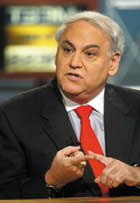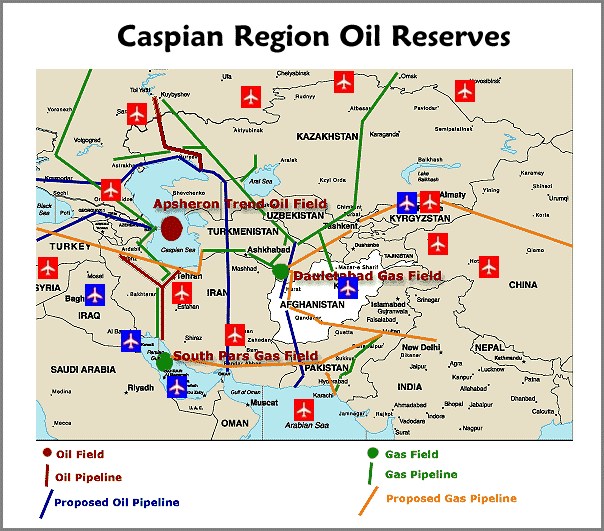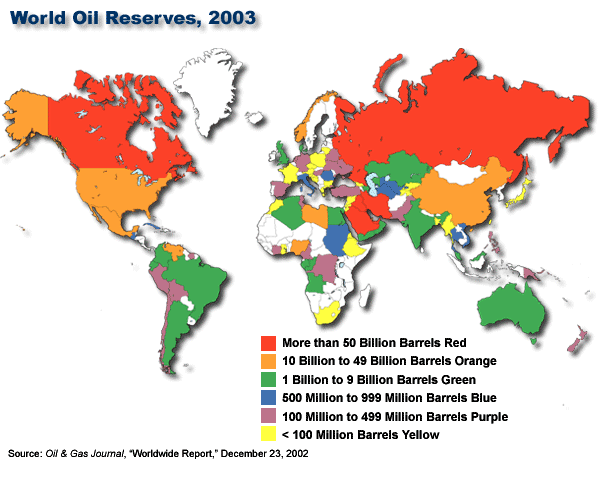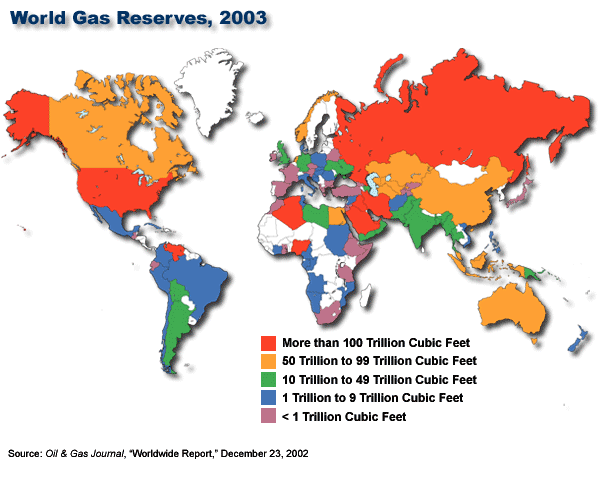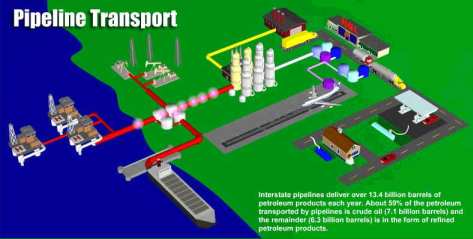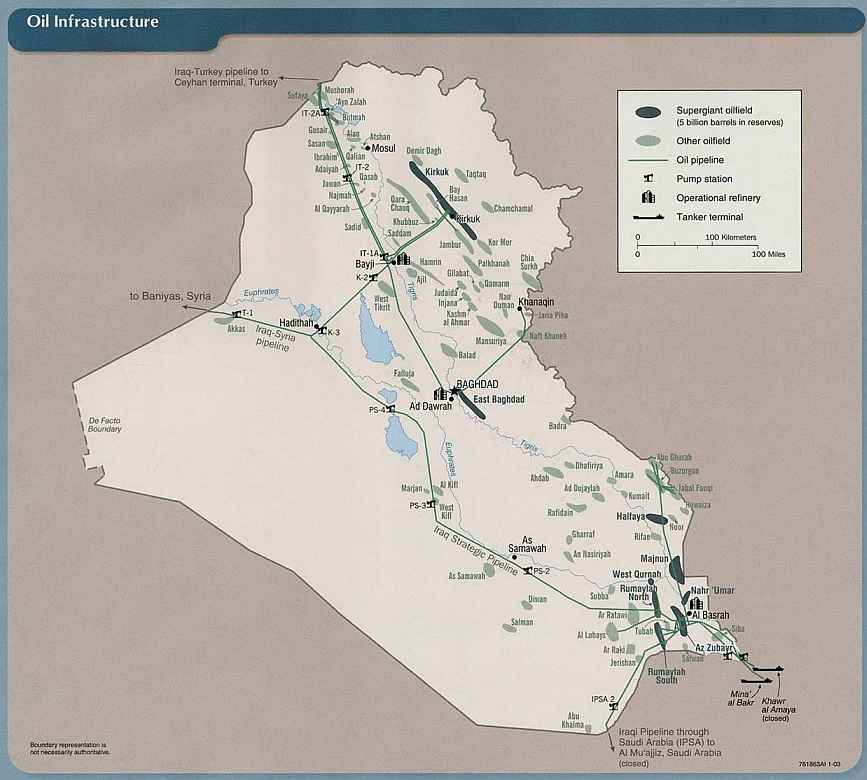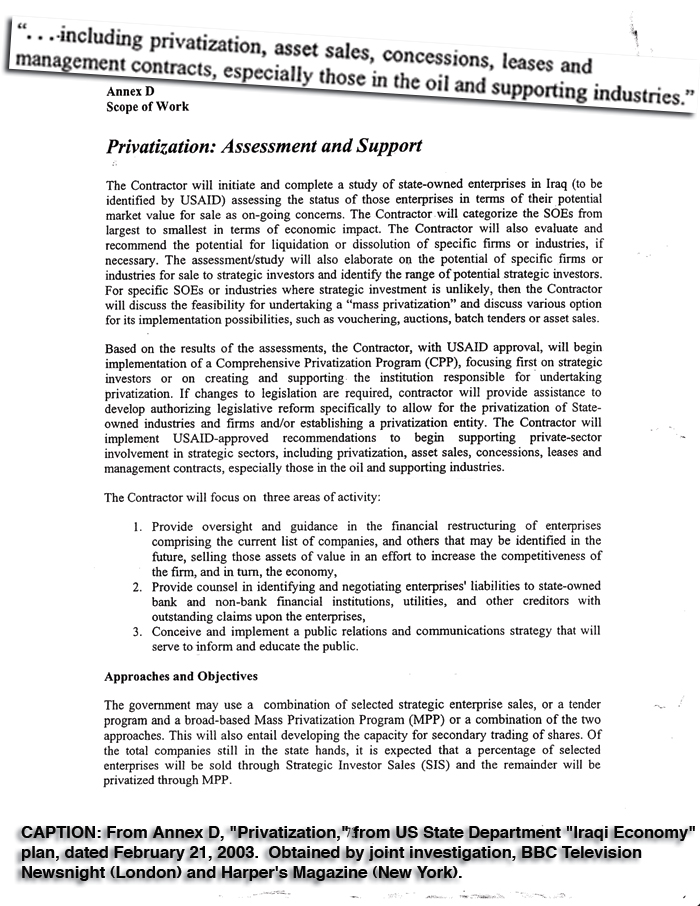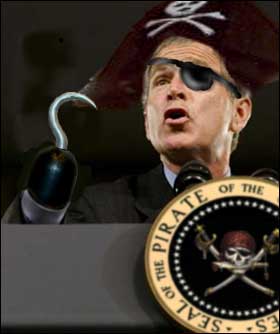|
The current price of Oil? Death...
The oil market has panicked twice in the past six weeks following terrorist outrages in the Middle East. In late April, oil prices rose after suicide bombers detonated speedboats laden with explosives next to Iraq's main tanker terminal in the Gulf at Basra. Early in May they again rose sharply after five employees of a Swiss company in Saudi Arabia were gunned down in Yanbu. -
Crisis Hits Saudi Oil Industry as al-Qa'ida Claims Slaughter of 22
|
Violence in Iraq and terrorist attacks make the price of oil rise?
Who could possibly benefit from that?
Damning Evidence of 'Big Oil' Conspiracy To Limit Supply
"As observed over the last few years and as projected well into the future, the most critical factor facing the refining industry on the West Coast is the surplus refining capacity, and the surplus gasoline production capacity. The same situation exists for the entire U.S. refining industry. Supply significantly exceeds demand year-round. This results in very poor refinery margins, and very poor refinery financial results. Significant events need to occur to assist in reducing supplies and/or increasing the demand for gasoline."
--Internal Texaco document, March 7, 1996
"A senior energy analyst at the recent API (American Petroleum Institute) convention warned that if the U.S. petroleum industry doesn't reduce its refining capacity, it will never see any substantial increase in refining margins...However, refining utilization has been rising, sustaining high levels of operations, thereby keeping prices low."
--Internal Chevron document, November 30, 1995
The oil industry and its allies would have the public believe that insufficient refining capacity, restrictive environmental standards, growing gasoline demand and OPEC production cutbacks are the primary reasons for the current oil and gas supply problem.
However, the record shows - supported by documents I have obtained - that . . . major oil companies pursued efforts to curtail refinery capacity as a strategy for improving profit margins; that competing oil companies worked together to subvert supply; that refinery closures inhibited supply; and that oil companies are reaping record profits, yet may benefit from a proposed national energy policy that would offer financial incentives to expand refinery capacity. [!!!]
* * *
[T]he nation's major oil suppliers have set out in a strategic effort to orchestrate a financial triple play, a coordinated effort that would reduce supply, raise prices at the pump and relax environmental regulations. Unfortunately, in each case, it is the consumer who takes the hit.
While the documents target activity on the West Coast and refinery closings in 11 states, they point to practices with significant national ramifications. The companies involved are national companies that operate in multiple states. In addition, gas and oil is a fungible commodity and the amount of capacity that has been taken offline is significant enough to affect national markets.
In his report, Senator Wyden made the following findings (abbreviated): - FINDING 1: Oil Companies Articulated their "Need" to Reduce Oil and Gas Supply to Increase Prices and Grow Profit Margins
Not only did the oil companies view excess refining capacity as a financial liability, they openly suggested that eliminating the excess capacity and tightening supply would help improve their bottom line.
[D]ocuments show that oil companies had the intent and motive to hamstring supply and reduce refining capacity. Subsequent events show that they acted [based on that intent]. <
/ul>- FINDING 2: Oil Company Competitors Planned Opportunities to Subvert Oil and Gas Supply . . .
"ARCO represents an important part of Tosco=s business. We want to do everything we can to nurture this important business relationship and make sure it keeps up the tradition of being mutually beneficial."
--Thank you note to ARCO Exec. VP James A. Middleton from Tosco CEO Thomas O'Malley, April 25, 1994
"... explore whether or not there was any mutual benefit, any mutual interest, any profit for both ARCO and Tosco to find a way to have ARCO purchase or Tosco sell CARB [cleaner burning California Air Resources Board] gasoline to ARCO, recognizing that the agreement that was in place at that time did not provide for the supply of CARB gasoline." --Summary of Deposition of William C. Rusnack, President of ARCO Products Co., taken May 15, 1997
"And he, as I recall, confirmed their interest ...and if we can reach a commercial agreement with them, that he felt, you know, this could change some of their investment decisions or change investment decisions of others on supplying CARB gasoline."
--Summary of Deposition of Cecil Blackwell, Senior Chevron Official, taken February 19, 1997
* * *
[M]ajor oil and gas companies supplying CARB gas to the California market entered into 44 supply-sharing agreements . . . to control the quantity of CARB gas on the market, reduce efforts to expand CARB refining capacity, limit imports of CARB gas and discourage excess CARB gas from being sold on the spot market to independent purchasers.
Exxon, ARCO, Chevron, Shell, Texaco, Tosco and Unocal all entered into such supply-sharing agreements with at least one of their competitors.
* * *
In February 1993, Mobil, Texaco and Chevron (with the financial support of Exxon) filed a lawsuit to overturn the small refiners' exemption to the CARB gas program, reducing the ability of small refiners to compete in the CARB gas market.
* * *
"If Powerine re-starts and gets the small refiner exemption, I believe the CARB market premium will be impacted. Could be as much as 2-3 cpg (cents per gallon)...The re-start of Powerine, which results in 20-25 TBD (thousand barrels per day) of gasoline supply . . . could . . . effectively set the CARB premium a couple of cpg lower . . .
Needless to say, we would all like to see Powerine stay down.
Full court press is warranted in this case." --Internal Mobil Corp. E-mail regarding Powerine refinery, February 6, 1996
The Powerine Oil Company refinery closed in 1995.
- FINDING 3: Closing Refineries: Oil Companies Act to Inhibit Supply
Since 1995, 24 refineries have closed, including refineries in California, Illinois, Arizona, Oklahoma, Indiana, Kansas, Louisiana, Texas, Mississippi, Michigan and Washington (the Tosco refinery has subsequently reopened), taking nearly 830,000 barrels a day of refining capacity offline. While capacity at some existing refineries expanded during this time, the fact is that more capacity would exist if these refineries were still operating.
- FINDING 4: Record Profits: Oil Companies Reap Benefit of Higher Prices at Pump
Despite complaints indicting the cost of environmental compliance and manufacturing "boutique" fuels, in the [year] 2000 the oil and gas industry enjoyed record profits that reflect record gas prices.
According to Texaco's 2000 Annual Report, the company's production steadily decreased from 1998 to 2000, yet its net income more than quadrupled during the same period
- with Texaco posting well above $2.4 billion in net income in 2000.
Among these four companies alone [Texaco, Chevron, ExxonMobil, and BP Amoco],
profits for the year 2000 increased by over $22 billion dollars in one year. In light of these substantial profits, oil industry claims that they cannot afford to comply with environmental regulations or expand their refining capacity lack credibility.
- FINDING 5: National Energy Policy Incentivizes Oil Companies to Expand Refinery Capacity
The Bush administration's National Energy Policy, released in May, points to lagging profit margins and costly environmental regulations during the past decade as the reason for lost refinery capacity. The report also states that, "excess capacity may have deterred some new capacity investments in the past," and that "more recently, other factors, such as regulations, have deterred investments." . . .
[Bush's recommended policies] will reward the same oil companies who perpetuated the gasoline supply crunch, [who already enjoy] record profits because of their actions, [with] even higher profits by recognizing the cost savings of relaxed environmental standards.
As a result, oil and gas profits would continue to rise, the public would be saddled with the costs of dirtier air, and consumers would remain unprotected from high gas prices.
How's that for a triple play?
- Reduce supply,
- Exploit the crisis, then
- Demand incentives to increase supply again!
Now, that your blood is boiling, let's start our own little national conspiracy. Here's the plan:- Impeach Cheney
- Impeach Bush
- Demand a Public Accounting of Big Oil Profits
source
|
|
|
Flashback:
US Checking Possibility of Pumping Oil from Northern Iraq to Haifa, via Jordan
August 25, 2003 -
The United States has asked Israel to check the possibility of pumping oil from Iraq to the oil refineries in Haifa. The request came in a telegram last week from a senior Pentagon official to a top Foreign Ministry official in Jerusalem.
The Prime Minister's Office, which views the pipeline to Haifa as a "bonus" the U.S. could give to Israel in return for its unequivocal support for the American-led campaign in Iraq, had asked the Americans for the official telegram.
The new pipeline would take oil from the Kirkuk area, where some 40 percent of Iraqi oil is produced, and transport it via Mosul, and then across Jordan to Israel. The U.S. telegram included a request for a cost estimate for repairing the Mosul-Haifa pipeline that was in use prior to 1948. During the War of Independence, the Iraqis stopped the flow of oil to Haifa and the pipeline fell into disrepair over the years. - Haaretz via common dreams
|
|
Greg Palast - SECRET U.S. PLANS FOR IRAQI OIL
The Bush administration made plans for war and for Iraq's oil before the 9/11 attacks
BBC Newsnight, March 17, 2005
The Bush administration made plans for war and for Iraq's oil before the 9/11 attacks, sparking a policy battle between neo-cons and Big Oil, BBC's Newsnight has revealed.
Two years ago today - when President George Bush announced US, British and Allied forces would begin to bomb Baghdad - protesters claimed the US had a secret plan for Iraq's oil once Saddam had been conquered. In fact there were two conflicting plans, setting off a hidden policy war between neo-conservatives at the Pentagon, on one side, versus a combination of "Big Oil" executives and US State Department "pragmatists". "Big Oil" appears to have won. The latest plan, obtained by Newsnight from the US State Department was, we learned, drafted with the help of American oil industry consultants.
Insiders told Newsnight that planning began "within weeks" of Bush's first taking office in 2001, long before the September 11th attack on the US. An Iraqi-born oil industry consultant, Falah Aljibury, says he took part in the secret meetings in California, Washington and the Middle East. He described a State Department plan for a forced coup d'etat. Mr Aljibury himself told Newsnight that he interviewed potential successors to Saddam Hussein on behalf of the Bush administration.
Secret sell-off plan
The industry-favoured plan was pushed aside by a secret plan, drafted just before the invasion in 2003, which called for the sell-off of all of Iraq's oil fields. The new plan was crafted by neo-conservatives intent on using Iraq's oil to destroy the Opec cartel through massive increases in production above Opec quotas.
The sell-off was given the green light in a secret meeting in London headed by Fadhil Chalabi shortly after the US entered Baghdad, according to Robert Ebel.
Mr Ebel, a former Energy and CIA oil analyst, now a fellow at the Center for Strategic and International Studies in Washington, told Newsnight he flew to the London meeting at the request of the State Department.
Mr Aljibury, once Ronald Reagan's "back-channel" to Saddam, claims that plans to sell off Iraq's oil, pushed by the US-installed Governing Council in 2003, helped instigate the insurgency and attacks on US and British occupying forces.
"Insurgents used this, saying, 'Look, you're losing your country, you're losing your resources to a bunch of wealthy billionaires who want to take you over and make your life miserable,'" said Mr Aljibury from his home near San Francisco. "We saw an increase in the bombing of oil facilities, pipelines, built on the premise that privatisation is coming."
Privatisation blocked by industry
Philip Carroll, the former CEO of Shell Oil USA who took control of Iraq's oil production for the US Government a month after the invasion, stalled the sell-off scheme. Mr Carroll told us he made it clear to Paul Bremer, the US occupation chief who arrived in Iraq in May 2003, that: "There was to be no privatisation of Iraqi oil resources or facilities while I was involved."
Ariel Cohen, of the neo-conservative Heritage Foundation, told Newsnight that an opportunity had been missed to privatise Iraq's oil fields. He advocated the plan as a means to help the US defeat Opec, and said America should have gone ahead with what he called a "no-brainer" decision. Mr Carroll hit back, telling Newsnight, "I would agree with that statement. To privatize would be a no-brainer. It would only be thought about by someone with no brain."
New plans, obtained from the State Department by Newsnight and Harper's Magazine under the US Freedom of Information Act, called for creation of a state-owned oil company favoured by the US oil industry. It was completed in January 2004 under the guidance of Amy Jaffe of the James Baker Institute in Texas.
Formerly US Secretary of State, Baker is now an attorney representing Exxon-Mobil and the Saudi Arabian government. Questioned by Newsnight, Ms Jaffe said the oil industry prefers state control of Iraq's oil over a sell-off because it fears a repeat of Russia's energy privatisation. In the wake of the collapse of the Soviet Union, US oil companies were barred from bidding for the reserves. Ms Jaffe says US oil companies are not warm to any plan that would undermine Opec and the current high oil price: "I'm not sure that if I'm the chair of an American company, and you put me on a lie detector test, I would say high oil prices are bad for me or my company."
The former Shell oil boss agrees. In Houston, he told Newsnight: "Many neo conservatives are people who have certain ideological beliefs about markets, about democracy, about this, that and the other. International oil companies, without exception, are very pragmatic commercial organizations. They don't have a theology."
A State Department spokesman told Newsnight they intended "to provide all possibilities to the Oil Ministry of Iraq and advocate none".
|
Bush Didn't Bungle Iraq, You Fools -
THE MISSION WAS INDEED ACCCOMPLISHED
Monday, March 20, 2006 by Greg Palast
Get off it. All the carping, belly-aching and complaining about George Bush's incompetence in Iraq, from both the Left and now the Right, is just dead wrong.
On the third anniversary of the tanks rolling over Iraq's border, most of the 59 million Homer Simpsons who voted for Bush are beginning to doubt if his mission was accomplished.
But don't kid yourself -- Bush and his co-conspirator, Dick Cheney, accomplished exactly what they set out to do. In case you've forgotten what their real mission was, let me remind you of White House spokesman Ari Fleisher's original announcement, three years ago, launching of what he called,
"Operation Iraqi Liberation."
O.I.L. How droll of them, how cute. Then, Karl Rove made the giggling boys in the White House change it to "OIF" -- Operation Iraqi Freedom. But the 101st Airborne wasn't sent to Basra to get its hands on Iraq's OIF.
"It's about oil," Robert Ebel told me. Who is Ebel? Formerly the CIA's top oil analyst, he was sent by the Pentagon, about a month before the invasion, to a secret confab in London with Saddam's former oil minister to finalize the plans for "liberating" Iraq's oil industry. In London, Bush's emissary Ebel also instructed Ibrahim Bahr al-Ulum, the man the Pentagon would choose as post-OIF oil minister for Iraq, on the correct method of disposing Iraq's crude.
And what did the USA want Iraq to do with Iraq's oil? The answer will surprise many of you: and it is uglier, more twisted, devilish and devious than anything imagined by the most conspiracy-addicted blogger. The answer can be found in a 323-page plan for Iraq's oil secretly drafted by the State Department. Our team got a hold of a copy; how, doesn't matter. The key thing is what's inside this thick Bush diktat: a directive to Iraqis to maintain a state oil company that will "enhance its relationship with OPEC."
Enhance its relationship with OPEC??? How strange: the government of the United States ordering Iraq to support the very OPEC oil cartel which is strangling our nation with outrageously high prices for crude.
Specifically, the system ordered up by the Bush cabal would keep a lid on Iraq's oil production -- limiting Iraq's oil pumping to the tight quota set by Saudi Arabia and the OPEC cartel.
There you have it. Yes, Bush went in for the oil -- not to get more of Iraq's oil, but to prevent Iraq producing too much of it.
You must keep in mind who paid for George's ranch and Dick's bunker: Big Oil. And Big Oil -- and their buck-buddies, the Saudis -- don't make money from pumping more oil, but from pumping less of it. The lower the supply, the higher the price.
It's Economics 101. The oil industry is run by a cartel, OPEC, and what economists call an "oligopoly" -- a tiny handful of operators who make more money when there's less oil, not more of it. So, every time the "insurgents" blow up a pipeline in Basra, every time Mad Mahmoud in Tehran threatens to cut supply, the price of oil leaps. And Dick and George just love it.
Dick and George didn't want more oil from Iraq, they wanted less. I know some of you, no matter what I write, insist that our President and his Veep are on the hunt for more crude so you can cheaply fill your family Hummer; that somehow, these two oil-patch babies are concerned that the price of gas in the USA is bumping up to $3 a gallon.
Not so, gentle souls. Three bucks a gallon in the States (and a quid a litre in Britain) means colossal profits for Big Oil, and that makes Dick's ticker go pitty-pat with joy. The top oily-gopolists, the five largest oil companies, pulled in $113 billion in profit in 2005 -- compared to a piddly $34 billion in 2002 before Operation Iraqi Liberation. In other words, it's been a good war for Big Oil.
As per Plan Bush, Bahr Al-Ulum became Iraq's occupation oil minister; the conquered nation "enhanced its relationship with OPEC;" and the price of oil, from Clinton peace-time to Bush war-time, shot up 317%.
In other words, on the third anniversary of invasion, we can say the attack and occupation is, indeed, a Mission Accomplished. However, it wasn't America's mission, nor the Iraqis'. It was a Mission Accomplished for OPEC and Big Oil.
|
but hey! It's not like we all NEED oil is it? er...
The 'modern world' has been engineered to become totally dependant on the substance
From power generation to the introduction of new synthetic substances
this planet is a slave colony run on the basis of our infrastructures addiction to oil
The concept of modernity has been hijacked by the Oil industrialists
who have engineered all industrial processes towards a system that they could control- globally,
Those who control OIL, control modernization, and now as we have seen in the rhetoric used in
'Operation Enduring freedom' the 'war on terror' and 'Operation Iraqi Freedom'
- this has become politicized as the concept of 'freedom'
|
Oil Analysts, Wrong Since 2001, End Forecasts of Price Drop
Dec. 28 2005 (Bloomberg) -- Wall Street oil analysts have given up calling for lower prices after missing the rallies of the past four years.
New York oil futures will average $60 a barrel in the first quarter of 2006, about $2 more than today, according to the median forecast of 25 analysts surveyed by Bloomberg. Prices will average $58 in all of 2006, the survey shows.
``Next year, we are going to see the continuation of a very tight market, vulnerable to supply shocks and disruption,'' said Kevin Norrish, a director of commodities research for Barclays Capital in London. Norrish and colleague Paul Horsnell had the highest and most accurate forecast for prices last year.
Oil averaged $56.67 this year, $15 more than in 2004 and the highest in two decades of New York trading. Crude touched a record $70.85 in 2005, hurting consumer spending and sparking record oil-industry profits. Credit Suisse First Boston analysts say Exxon Mobil Corp., BP Plc, Royal Dutch Shell Plc, Chevron Corp. and Total SA this year will probably earn $108 billion, the size of Venezuela's economy.
Oil futures have more than tripled since November 2001 as fuel demand rose, especially in China, the second-largest energy consumer. The Iraq War and civil unrest in Venezuela and Nigeria have contributed to high prices.
Bad Calls
Oil analysts got it wrong this year, predicting that prices would average $40.33 in 2005. Wall Street had forecast that oil would be $26.81 during 2004, the December 2003 survey showed. Instead, crude in New York averaged $41.40 in 2004.
``The dynamic shifted this year,'' said Doug Leggate, senior oil analyst at Citigroup Inc. in New York. ``There was a growing perception that supply was running out. The doomsday scenario that stated OPEC couldn't meet demand and the Saudis wouldn't be able to increase output gained traction.''
Matthew Simmons, chairman of Houston-based energy investment bank Simmons & Co., wrote in ``Twilight in the Desert: The Coming Saudi Oil Shock and the World Economy'' that about 90 percent of Saudi Arabia's oil output comes from seven fields, including three that have pumped for more than 50 years. Some fields are expected to rapidly decline with few replacement sources, he said.
Goldman Sachs Group Inc. analyst Arjun Murti in New York, who roiled oil markets in March by saying crude may reach $105 a barrel, said in a report on Dec. 12 that his forecast may be conservative if the ``peak oil'' theory is right. He forecasts oil of $50 to $105 a barrel until 2009.
Wall Street Profits
Wall Street companies have beefed up their energy-trading desks to benefit from high oil prices.
Goldman Sachs last week said net revenue from trading bonds, currencies and commodities climbed 16 percent this year to $8.48 billion. Revenue from commodities was ``strong,'' according to the company, which doesn't give a more detailed breakdown of the results.
Morgan Stanley, the second-biggest U.S. securities firm by market value, increased its bets in commodities by 53 percent in its fiscal fourth quarter, faster than in any other market, as natural gas and electricity prices rose. The firm's so-called value at risk, used by accountants to measure potential losses, in commodities averaged $46 million a day in the three months ending Nov. 30. In bonds the total was $53 million.
Neal Shear, who in April moved from running Morgan Stanley's commodities unit to become co-head of institutional sales and trading, got a $16 million year-end bonus, according to a company filing.
Global Demand
Global oil demand will increase by 1.79 million barrels a day in 2006, according to the International Energy Agency. Consumption rose 1.1 million barrels, or 1.3 percent, this year, the agency said this month. Demand accelerated 3.8 percent in 2004, the fastest since 1976.
``The issue is you had exceptional demand growth in 2004 and it continued in 2005, crimping refining capacity further,'' said Craig Pennington, the head energy analyst at Schroders Plc in London.
Not everyone agrees prices are heading higher, especially after demand peaks during the Northern Hemisphere winter.
``As we move through the winter, prices will fall below $50 and prices could average in the $40s in 2006,'' said Richard Savage, head of global commodities research at Bank of America in London. ``Investors think prices will stabilize and that will dampen enthusiasm.''
The median oil price forecast for Brent crude oil, which is traded on the London-based ICE Futures exchange, is $58 for the first quarter and $56.07 for 2006, according to the survey.
Pickens's View
``We think the first half of the year is going to be somewhat slow, pick up later in the year and in the fourth quarter we'll be back up to levels like we are now,'' said Boone Pickens, a former oil executive and now a hedge fund manager.
The Organization of Petroleum Exporting Countries agreed on Dec. 12 to keep output quotas unchanged at 28 million barrels a day and to withdraw a previous offer to use as much of its 2 million barrels a day of spare capacity as needed. The extra barrels were made available after Hurricanes Katrina and Rita struck the U.S.
``OPEC always had control on the downside because it is relatively easy to cut production,'' Leggate said. ``OPEC lost control on the upside this year because they didn't have enough spare capacity.''
OPEC will have to pump 28.5 million barrels a day in 2006 to meet demand, the IEA said on Dec. 13, up 200,000 a day from a month earlier.
Bloomberg
|
Imagine for a moment that we are told the very thing we are assured is the lifeblood of the planet
is actually running out...that production of this commodity will peak, and a crisis looms that could threaten an entire civilization...
Now imagine that the scenario of desperation for OIL is indeed a lie.
There is no shortage in oil, and that there are also other costless & limitless energy resources.
But the impending doom is just the pretext needed to stage many geo-strategic wars and to conveniently define 'freedom'.
It is not only oil that is being manipulated for the purpose of global domination...it is water and food...
All these elements provide us with life and the energy with which to survive, live and continue.
Now, ask yourself...
who are the REAL terrorists?
A Global energy cartel
|
The order of the Skull and bones...
|
"The background to Skull and Bones is a story of Opium and Empire, and a bitter struggle for political control over the new U.S. republic.
Samuel Russell, second cousin to Bones founder William H., established Russell and Company in 1823. Its business was to acquire opium from Turkey and smuggle
it into China, where it was strictly prohibited, under the armed protection of the British Empire." a capsule history and an intimate peek at one section of the US Ruling Class
|
|
|
"The men called their organization the Brotherhood of Death, or, more informally, the Order of Skull and Bones. They adopted the numerological symbol 322 because their group was the second chapter of the German organization and founded in 1832. They worshiped the goddess Eulogia, celebrated pirates, and plotted an underground conspiracy to dominate the world."
Secrets of the Tomb
Skull and Bones, the Ivy League, and the Hidden Paths of Power
|
|
|
Hey! If the world money system is a sham...
Is it beyond the realm of possibility
that the Fossil fuel crisis is a form of economic warfare?
...and the 'war on terror is a lie?
So, what... I hear you ask, are these elites plundering for? because it's not just 'GW Bush' - He's a corporate PUPPET
It is no co-incidence that the areas of
poverty & slavery around the globe,
are rich in oil & mineral deposits, which are very useful
in creating order out of chaos...
it is the order of the modern security state...
out of the chaos of the social engineering of poverty which causes Militancy, which justifies 'the war on terror'...
|
|
for example...
Water, Food, Drugs, Manufactiuring materiels, Industry, Power, Energy, Securi-tech, Culture, Entertainment
all commodities under global control by
'The Corporation'
a 'Cartel'
via a color coded revolution
|
|
|

